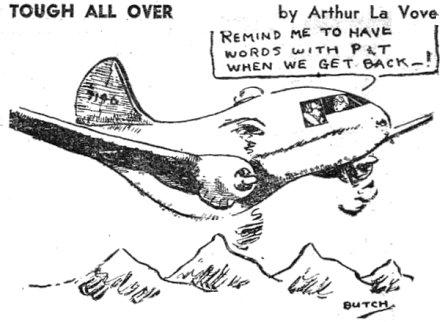
Vol. 1, No. 30 Published by India China Division, Air Transport Command August 9, 1945

|
New Weapon
Smashes Japs
On Hiroshima
Of 20,000 Tons of TNT
Reverberations of a single terrifying bomb which possibly obliterated a Japanese military city drowned out the roar of high explosives rained by 120 Superforts on Toyokawa naval arsenal 175 miles southwest of Tokyo, according to Army News Service.
London predicted the Allies would hand Japan a new ultimatum packing the power of the atomic bomb which blasted Hiroshima and shrouded it in a cloud of impenetrable smoke and dust. Hirohito's advisors would have a choice between unconditional surrender within 48 hours or oblivion for their island.
'Considerable Damage'
Washington mentioned Tokyo or another key Nipponese city as the next probable target of the atomic bomb. Tokyo, in cautious words of an imperial communiqu , according to ANS, admitted "considerable damage" caused to Hiroshima by "new-type bombs."
Authoritative U.S. sources suggested that details would show that the city of more than 300,000 was "just about wiped out" by the bomb containing more power than 20,000 tons of TNT, producing more than 2,000 times the blast of the biggest bomb ever used.
First revelation of the new atomic bomb was made by Pres. Truman who said the explosive "harnesses the basic power of the universe, adding a new and revolutionary increase in destruction."
City Vanished
Unveiling of the bomb was seen as an explanation of why some commanders in the Pacific have hinted that the war against Japan might be won from the air, as the Japs have no defense against the atomic bomb.
In a news report, datelined San Francisco, it was revealed that the atomic bomb may have been dropped by parachute and exploded before it hit the ground. A Japanese Domei broadcast said "the destructive power of the new weapon cannot be slighted" and admitted reports branding it "a destroyer of justice and mankind" and "public enemy No. 1 of social justice."
Its development culminated three years of work by Allied scientists, industry, labor and military forces, at a cost of nearly two billion dollars.
In initial tests in the New Mexico desert, an explosion sent a fiery cloud 50,000 feet into the sky and the force of the pressure wave probably extended much higher.
During tests steel structures were utterly destroyed - not merely disintegrated, but transferred instantly to gas. Two men were knocked down while standing outside a control tower more than five miles from the steel tower where the blast was set off. Those who have been working on experiments believe its development will prove "immeasurably more important than the discovery of electricity or any other great discoveries."
The size of the bomb is not revealed, but a commentator for the British Ministry of Aircraft Production in London is quoted by the Associated Press as saying it is "ten times smaller than the blockbuster but many times as powerful." This would mean the new bomb weighs about 400 pounds.
A single bomb carries a combined destructive power of 2,000 Superforts loaded to capacity with ten tons of bombs each, it was said. Its force is more than three times greater than the effect of the greatest aerial attack in history - 6,632 tons dropped by 820 Superforts on Japan, August 2. In the greatest single attack against the Germans, some 1,200 B-17s took part. One atomic bomb carries enough destruction to equal the bomb load of 3,300 heavy bombers used against Hitler's Reich.
|
Officers, GIs Pitch In, Sling Cargo
To Swell Hump Tonnage
"Let's go - what are we waiting for?" was the theme of Air Force Day in ICD. And there wasn't much waiting.
At Chabua, a British officer stood in a corner of the space control office and gazed at the milling hundreds of Americans, each adding his mite to the day's achievement - and the day's babble.
"Never saw anything like it." said the Britisher (who, of course was quite right). "Is it always like this here?"
Loudspeakers were torn between jive and takeoff announcements. Coolies, "pioneer troops" and GIs wrestled drums. Trucks ground by, their bids riding low under tons of gas. Fork-lifts clustered like bees about the doors of 46s and 54s.
At Misamari, two mobile kitchens were set up on the line, and (among other things) they dished out 13,500 "flesh eggis."
At Kunming, 4,800 "cupsa cawfee" and 1,903 candy bars were converted into ergs.
At Kurmitola, 20 typewriter-pilots forsook the keyboard to load gas drums, working in two 12-hour shifts, and two fast-working ground crews landed themselves a prize of bahoot U.S. whisky.
At Chabua, 15 inches of water surrounded the operations building and inspired two GIs to obtain a rubber life-raft and show an eager photographer just how dauntless American soldiers can be.
'What's Kurmitola?'
At Shamshernagar, white-painted MP motorcycles escorted fuel-servicing units from dumps to planes, and radio ops with walkie-talkies relayed trouble-reports and enabled supply and personnel to rush aid where needed.
T/Sgt. Peter Churitch, of Wakefield, Mich., and the Assam Valley, was asked by a scribe what he thought about Air Force Day. Sgt. Churitch, an ETO veteran of 35 missions over Europe, had this message: "I don't have time to think about it much, but I'll give it some thought if the weather is good tonight."
|
During the day a B-29 called in and asked where he was, "Kurmitola," they told him. "Kurmitola? Never heard of it - where the hell is it?"
The 1333's biggest pool on the day's proceedings amounted to Rs. 500. Up at the 1342 BU a $4,000 challenge was made to other China stations, and there were no takers.
Threat to Mrs.
At 1328, tower op S/Sgt. Nick Fiore paused in his stream of air-ground talk. "I'll be able to out-talk my wife after the war," he announced. (Mrs. Fiore is a tower op at Langley Field).
Lt. Col. Claron U. Pratt "drew the 104th," it was reported. If his men flew 100 trips, the colonel had said, he'd take the 101st over. But he hadn't reckoned with the turnaround rate, and when the colonel was ready, 101 had gone. So had 102 and 103. He took 104 over.
All day long, coolies on both sides of the Hump were agog. They stared at the mad Americans, then slowly they caught the spirit and decided it was teek hai and/or ding hao.
At one base the chaplain proved the best freight unloader. At another the CO appeared in a red fireman's hat labeled, "Big Chief Turn 'Em Around."
Agility Jao
A plane just ferried in from overseas rolled up a Bengal wing ramp. As the pilot started out the hatch, he was met by a fork-lift shoving in a pallet of drums. "What goes on?" he asked. "This ship hasn't been converted."
"Just get out an we'll convert it. Routine procedure." Three hours later the ship was stripped of seats and taking off with gasoline.
A pilot over the Hump foothills reported trouble with his booster pumps and was advised to turn back. "Hell," he responded, "I've got to land somewhere. It might as well be China." So it was.
Said Col. Richard F. Bromiley, China wing commander: "When there wasn't a way to do the job, somebody invented one."
Said an anonymous GI: "It's a lucky thing for the Japs that Air Force Day comes but once a year."
Air Force Day Tale To Get Author Prize
What was the most interesting thing you saw on Air Force Day? What was the funniest thing that happened? What person or group displayed the most ingenuity in accomplishing an unusual job?
If you'll sit down, right now, and answer one of these questions, you may find yourself the winner of one bottle of genuine guaranteed first-class jungle ration, complete with original contents, cork and seal!
The Hump Express will receive all entries. Just write yours, address it to "Air Force Day, Editor, Hump Express, Hq., ICD-ATC, APO 192" and mail it on or before August 16.
Backpats From Generals
Hq., Calcutta - Lt. Gen. Harold L. George, CG of ATC, communicated the personal commendation of Gen. Henry H. Arnold, Air Forces commander, for its "unprecedented record" on Air Force Day.
The wire asserted the "exceptional airlift could not have been accomplished without outstanding leadership, superior morale, and an organization imbued with high espirit de corps."
Congratulations came also from Lt. Gen. R. A. Wheeler, who credited ICD with a "magnificent achievement," and Lt. Gen. A. C. Wedemeyer, China Theater commander, who termed the activities "one of the outstanding records of this war."
Delhi Priority Call Brings 'Iron Lung' To Save GI Patient
1305 BU, Dum Dum, India - With a soldier's life in the balance, time was given top priority here recently when a call came through for a respirator, urgently needed at Delhi.
Calling a halt to routine duties, P & T immediately contacted a hospital in Calcutta, and arrangements were made to transfer the iron lung patient to a stationary respirator and obtain a smaller portable lung. With all facilities in action, space control, P & T, and air freight were waiting with full equipment when the life-giving respirator arrived here.
In less than six and one half hours, a giant Commando landed the medical unit at Delhi, ready for immediate use by the hospital there, and Dum Dum P & T personnel returned to routine activities.
|
Plays an Important Role
In Keeping Planes Going
Hq., Calcutta - AACS played its part in ICD's big day, to nobody's surprise.
The local wing of the Army Airways Communications System, commanded by Col. A. J. Mandelbaum, furnished navigational aids and communications facilities for ICD planes throughout the sensational 24 hours which have earned the division plaudits unexampled in its history.
AACS has been out here with ATC for a long time, but the work it does is the quiet sort of work which can escape attention. Behind its record lies a whale of a story.
World's Greatest
In the fall of 1942, stretching in a thin line from Karachi to Kunming, there were but nine AACS stations.
Today, the world's greatest concentration of aerial navigational aids and the world's most extensive and comprehensive communications system guard the air routes over Burma and China - the culmination of long-range planning and close co-operating between these two AAF teams.
Following are some of the contributions of AACS to the record performance on Air Force Day:
A total of 3,210,412 word-groups was transmitted - PXs (departures and arrivals), aircraft statistical information, traffic control reports, and weather messages.
QDMs, Too
This figure far exceeds the daily AACS average of 2,183,000 word-groups, and conveys a notion of the swelling of point-to-point traffic induced by the ICD "Experience Day" performance. This is reflected also in the air-ground contact total during the 24 hours. ATC crews contacted AACS ground stations 15,963 times.
In the language of radiomen, aircraft bearings are called "QDMs," explained to the layman as "a request from aircraft to a radio station for current magnetic heading to reach the station called." It's the navigator's method of checking his course and ascertaining that he isn't lost. On Air Force Day, 277 QDMs were given by AACS operators.
'Thank You'
To AACS ground men, perhaps the most satisfying part of their routine is "taking a fix" on a lost plane. A "fix" involves co-operation of many stations, and demands co-ordination of direction-finders, communications, plotting and passing. It means teamwork between stations, and often can mean the salvation of plane, cargo and men.
On Air Force Day, direction-finding nets of the AACS wing took 31 "fixes" for off-course planes, and when the airman said, "Thank you," the AACS guy knew he meant it.
That's the way AACS men were working with ICD on "E Day." But that doesn't include outposts out west to Karachi and out south to Colombo, and out north and east to unmentionable places in China, where AACS men operate military stations. They were briefed to assist if called upon. No such emergency developed.
Gen. Stilwell Loses Old Campaign Hat; Offers $25 Reward
Okinawa (ANS) - Dumbo rescue planes were almost called into the search last week when Gen. Joe Stilwell's battered campaign hat was lost at sea.
The hat - worn by the general for more than 20 years - blew out of a Cub observation plane over the ocean off Okinawa.
"Do you want to go down and get it?" asked Sgt. Lyle W. White, the pilot.
"I'd sure like to go down there and rescue my old friend," the Tenth Army's commander said wistfully.
When the plane returned to the landing field Stilwell offered a $25 reward for the return of the hat and hundreds of soldiers fanned out in a wide hunt by air and sea.
After four hours the prize was spotted by Cpl. Edward Donahue, Cleveland, Ohio, 200 yards offshore. Stilwell paid off, squeezed out the salt water and hung up his old friend to dry.
No Fraternity Here But Things Getting Exclusive Indeed
1337 BU, Sookerating, Assam - Technical supply and engineering have opened a beanery for their exclusive use which reminds one of those holes-in-the-wall at home where the counterman casually asks the state of one's home life.
With great appetites gnawing at their stomachs, engineering personnel set up their own eatery for the use of line personnel only.
Enterprising engineers even thought of air conditioning. One of the fellows in the sheet metal shop had been a cook before being reclassified and now takes a couple hours a day to renew his acquaintance with cooking.
No Revision In Discharge Point Totals
Figure Will Be Altered To Include 700,000 More Men
Washington (ANS) - Total of points to determine men eligible for classification as surplus and for possible discharge will remain at 85 temporarily, Secretary of War Stimson announced.
Stimson said that 800,000 men now have 85 or more points. He said that the score would eventually be revised to provide for the discharge of another 700,000. He emphasized, however, that the prospects of the first 800,000 would not be affected in any way by the revision.
Stimson said the critical score, when announced, will provide for service after readjustment day, originally fixed at May 12. Under the point system the Army will release 1,500,000 men by June 1, 1946.
The other 700,000 are expected to qualify when the critical score is announced to replace the present interim score. Of the 800,000 who had 85 points, 235,000 were released by July 31, Stimson said. He emphasized that winning the war was the Army's primary objective and that discharge plans had been worked out in co-operation with Gen. MacArthur and other Pacific commanders.
According to Stimson, there will be no critical score for officers although their individual scores would also be re-computed.
All Bases To Take Property Inventory During This Month
Hq., Calcutta - On Aug. 16, 17 and 18 complete inventories of all non-expendable or expendable property will be taken at every ICD base, according to the supply and services department.
One of the purposes for this inventory is to generally "put the house in order" so that bases may be closed easily and quickly when the time arrives.
One of the biggest problems of the survey, according to Col. E. E. Hamm, S & S chief, is to bring it to the attention of individual personnel. It is designed to include tools and other equipment now in the personal care of men who use them in their assigned duties. For this purpose co-operation of I & E has been sought, and the inventory will be publicized by base newspapers.
|
A Morale Factor,
China Medic Claims
1350 BU, Kunming - Improvement of diet and sanitation has enhanced the eating outlook in China in the last three months, in the opinion of Maj. James B. Montgomery, Lafayette, Ind.
The major, China wing medical officer, just completed a swing through ATC bases here, upon his return to the theater from a Stateside leave. He credited the bettering of the food situation to a boost in morale of personnel.
Mess officers, at one time picked at random, now are selected on the basis of skill and knowledge as dietitians - with an eye to taste as well as vitamins. Better meal planning, according to Maj. Montgomery, now guarantees high-grade sugar and flour for each meal, and condiments and jams on tables.
Sanitation betterment, he said, has kept illness to a minimum. Most cases of dysentery, in his opinion, originate with "unwise" eating in local restaurants.
To Get What You Want Send Your Bearer Out
1328 BU, Misamari, Assam - After five successive night flights Capt. Creighton Sanderson felt justified in telling his roommate that he was tired of flying at night and would like a day trip.
Capt. Sanderson failed to note that his bearer, Mohammed, was in the basha, listening to everything.
The next morning, Mohammed, who speaks fairly good English, made his way to the line. He walked into the operations office and requested audience with the "burra sahib." He was sent to the chief pilot.
At the chief pilot's desk Mohammed drew himself up to his full five feet and said: "My sahib makes too many night trips. Him damn tired. Him want a day trip."
And that's how Capt. Sanderson was given a day flight.
|
CHIN UP . . .
One of the chaplains assigned to ICD decided that if he was going to be a real buddy to his boys he would have to fly with them. So he made a Hump trip.
Going over, everything was fine. On the way back the plane iced up, lost an engine and the crew and the chaplain had to bail out. The chaplain landed near a small stream in the Himalayas. Being a resourceful man, and at this time more than a little put out that he had to pick the wrong trip, he decided that if his boys back at the base wanted to see any more of him they'd have to come and get him.
Days passed. Nights passed. He made a shelter out of his parachute, settled back to eating the rations in his jungle kit, drank water from the stream, and waited. Finally an L-5 rescue plane came buzzing along, saw the smoke from his campfire, the white of his 'chute canopy and decided to have a look-see.
After giving the surrounding countryside a good casing, the putt-putt swooped down, dropped a package and went on its way. The streamer-chute landed in the stream.
Anxious to receive the parcel, the chaplain waded out into the water, slipped, fell flat in the stream but finally reached the precious package. Back on shore he unraveled the wrappings and found nothing but a note.
It said . . . "Chin up, old boy."
STORMY WEATHER . . .
Weather in the Assam Valley can really be stinking. It was stinking that day when Lt. Ed Blouin tried to talk his way out of making a special Hump mission.
Not that Blouin was trying to get out of something. Ed never tried to get out of anything. But he thought it was just common sense to stay on the ground. The clouds were down to about a hundred feet off the runway, melted into the taller trees at the edge of the airstrip. Drizzle and rain had killed the visibility, cut it to less than a mile. It just wasn't smart to be flying in this kind of stuff.
"Jeeze, Captain. That stuff is lousy out there. Why, even the boids are walking." The operations officer wouldn't co-operate. The trip was priority, had to go.
"No soap, you got an instrument card, ain't you? Okay, here's your chance to use it. Grab your clearance and get going. Scram! Take off! Get it in the gray. You're late. Already you're late. Even if you take off ten minutes ago you're late. Getta hell outta here!"
Ed walked to the door, picked up his parachute and went out. Presently he was back peering through the screen door. His long chin made a dent in the wire-mesh.
"Hey, captain. Ca'mere a second willya?" The operator walked over to the door. Ed pointed out to the road.
"See, what I tell you?"
There, walking down the muddy lane, was a string of crows. They made their way around puddles and ruts. Once in a while one of them would look up at the sky and shake his head, then go back to walking along.
So did Ed.
HI-LO . . .
It isn't hard to figure out who's coming on, if you hear the drone of engines in the overcast, shuttling back and forth, you can be pretty sure it's ATC. If, suddenly you see a shadow taxiing buzzing down the runway, you can be pretty sure it belongs to that hard-flying, crazy bunch of guys known as Com-Car.
Both groups have their own way of doing things, and both ways work out fine. ATC prefers the instrument let-down; Com-Car takes a liking to the low approach, sneaking in under the clouds.
Really doesn't make much difference how the boys get there. The big thing is, they make it every time . . . and on top of that they are doing a great job.
|
Fliers Find Ding Hao
Is Not so Teek
Tried and Trusty Phrase Proves Inadequate In Pinch
1328 BU, Misamari, Assam - A recent bailout over the Hump by 1328 men has convinced GIs here that there's more to speaking Chinese than giving out with an expressive "ding hao."
When the members of a crew from this base were forced to bail out recently, it wasn't long before Lt. Robert Lineberger, Lincolnton, N.C.; S/Sgt. Raymond B. Smalley, Harrodsburg, Ky., and T/Sgt. Edward Behnke, Long Island, got together on the ground. Setting out to find a village and transportation back to their home base, they were happy to see a Chinese approaching.
Nay Malum
"Ding Hao," Lt. Lineberger called out genially, using the only Chinese words he knew and thinking the coolie would understand the well-known greeting. The coolie didn't, and neither did the other Chinese in the village to which the ATC men were led.
By this time the men were convinced they'd never be understood, but were glad to accept the hospitality the Chinese offered. From the gestures of the Chinese they understood that they were being offered food and a place to sleep in a nearby hut, and in a final last-minute hope, the lieutenant once more shouted "ding hao" as he approached the place.
'Ding Hao'
"Ding hao!" came in lusty tones from the hut, and the three Americans rushed in, happy that they had at last found some Chinese who could really speak the language. They crowded inside to find the speaker - F/O Kyle D. Garver, of Dallas, Tex., their own co-pilot!
The men reached their base eventually, unanimously agreed about one thing: "Ding hao" isn't as potent as GIs are made to believe!
Two Thompsons Sorrily Afflicted By Mail Disorders
1340 BU, Kunming - Mail call here is a race between Joseph C. (for Charles) Thompson and Joseph C. (for Coleman) Thompson to see who is going to get the sugar reports for the day.
The mail clerks at Squadron B have given up their efforts to separate the two soldiers' mail after trying to give everything from south of the Mason-Dixon Line to J. C. (for Coleman) Thompson who hails from Sylvia, N.C., and everything from north of it to J. C. (for Charles) Thompson who calls Salt Lake City his home.
"Maybe the personnel office will add both our points for discharge together and send one of us home," hopes J. C. (for Coleman) who is assigned to duty as a cook at this base.
"Not a chance," replies J. C. (for Charles) who works in personnel as a personal affairs clerk. "Personnel never slips up."
Fast Action Saves Plane
Aircraft Fueling Mishap Almost Became Tragedy
1359 BU, China - Fast action by five GIs saved their lives, a C-54 and two refueling units which caught fire in the midst of a servicing operation here.
As Cpl. George Bream was fueling a Skymaster, an air lock caused the F-2 unit to malfunction and throw gasoline over the driving unit. Flames immediately enveloped the trailer, and S/Sgt. Everett Lamb suffered severe burns.
Drive Units Off
The fire spread rapidly, covering most of the left wing of the C-54 and a nearby F-3 fuel unit. An explosion was imminent as Pfc. Fred Gallagher leaped into his truck cab to drive the flaming vehicle away from the plane. S/Sgt. Charles T. Tomaso followed suit, driving his tractor unit to a safe distance from the ship where Cpl. Leslie Ferguson unhooked the blazing trailer.
Saves C-54 Wing
In the meantime Cpl. Bream had dashed from the ship's wing through the escape hatch at the first sign of fire. Reappearing with an extinguisher, he soon had the flames on the wing under control.
The five enlisted men, with other line personnel, used carbon dioxide bottles, wet blankets and sand to extinguish the fire in the two fueling units.
Manpowerists Issue Denial Of Any Officer-Preference
New York (ANS) - A recent War Manpower Commission memorandum, directing U.S. Employment Service regional offices to make a survey of peacetime jobs available to discharged Army officers, was "unfortunately worded to make it sound as though executive positions were being reserved for former officers," WMC declares.
WMC's reply to charges that it was favoring officers over GIs was reported Saturday by Marquis Childs, the New York Post's Washington columnist.
Childs said it was not the intention of WMC to reserve executive positions for officers. WMC, which directs activities of the U.S. Employment Service, planned the job survey, Childs reported, as a means of helping former servicemen - both GIs and officers - get peacetime positions in which they could use skills acquired during military service.
Childs said Congressmen received many letters from GIs, protesting against the reported favorites.
One typical letter from a non-com, as quoted by Childs, said:
"We have lacked the breaks for a long time. We would appreciate an opportunity to compete fairly for jobs after the war. The officers should be given no more privileges and should have to sell themselves to employers the same as we must. If they are good men, let them prove it."
Childs said WMC was "surprised by the flare-up."
|
Alcoholic Odyssey Yields
Novel Selection-Standard
1360 BU, China - This whisky problem in China is really something - American GIs are trying to buy it by bottle-color now! And there are some men from this base who will tell you it can't be done.
F/O B. L. Semtner, Jr., and a friend recently decided to take a fling at Chinese whisky, just to compare the taste with the genuine drink at a later date. With a plentiful supply of CN and the little Chinese "red" book, the two strolled into a lively-looking bar in a nearby town, all set for a big evening.
First, a Red One
"Whisky?" inquired F/O Sentner politely, not much surprised when the "nay malum" look crossed the bartender's face. Out came the red book, but it failed to yield the word or any synonym. That's when the pair decided to shop by bottle-color.
First there was a red bottle. It turned out to be wine, a poor substitute for the he-man drink. The boys decided to try another color. Entering into the spirit of the game, the friendly Chinese pointed to a sizzling, sparkling liquid in a clear bottle. The flight officer and his friend did a little sizzling inside when they drank this, and swear they can't describe what it tasted like. But it wasn't whisky!
Dynamite?
Bar and bottles were blurring by now, so the boys stepped back to select the next drink. A tricky little green bottle was the choice this time, so out came the jigger and there was another bottoms-up. Dynamite, 160-proof wood alcohol. Worcestershire sauce - whatever the drink - after the GIs got the bar balanced and a straight line to the door marked, they decided they were playing a losing game.
The two are waiting till they can buy a supply of Bromo-Seltzer before they sample the other colors.
Are You Worried? Are You Nervous? See Doctor Gallup
New York (ANS) - GIs don't have to worry about their wives stepping out while they're overseas if Dr. George Gallup's pollsters talked to the right people.
Eighty-five percent of those interviewed answered "No" when asked, "Do you think a woman whose husband is overseas should accept dates with other men?"
Six percent - probably hopeful wolves - answered "Yes" while four percent were undecided. Five percent of the voters said, "Yes" but wanted to qualify their answers so that it was OK for wives to date in groups or go out with personal friends of the husband or with relatives.
Women interviewed were even stronger in their opinion than the men, with 87 percent of the ladies against dating in the husband's absence. Of the men, 83 percent voted "No."
In an earlier survey the public approved the idea of women going to Europe to visit husbands but both Truman and Eisenhower threw cold water on the scheme on the grounds that conditions there are too chaotic and the best place for a re-union is back in the U.S. - as soon as possible.
Behemoth 'Godown' Goes Up in China
1340 BU, Kunming - "Handmade in China" might well be a fitting caption for the mammoth warehouse, newest addition to this base, which went into operation recently.
With no walls, the open-air building provides a maximum of storage space for trucks operating for the many agencies it services. It also includes two offices for warehouse personnel.
Hindu Creed Played Part In Discovery
Necessity of Mathematics Felt in Orient Long Ago
Ed. - This is another in a series of articles on India by Prof. Viswani. Views expressed are those of the writer and do not necessarily reflect the opinion of the ICD or the Hump Express.
By B. J. Vaswani
The science of mathematics began in India about 4,500 years ago when the ancient Hindus felt the necessity of erecting sacrificial altars of the sizes and shapes required in rituals.
Long before Pythagoras (540 B.C.) the theorem associated with his name had been enunciated in India and instances of its application occur in ancient Sanskrit works which go back 2,000 years B.C.
Germs of Algebra
Burk, Hankel and Schopenhauer are agreed that the early Hindus knew a geometrical proof of the theorem of the square of the diagonal. In the Sulba (geometry) the Vedic Hindus solved propositions about the construction of various rectilineal figures, combination, transformation and application of areas and volumes, squaring of the circle, and about similar figures.
This Vedic Geometry (2,000 B.C.) contained also the germs of Hindu algebra. It has a solution of the complete quadratic equation, ax² plus bx=c. And its most noteworthy achievements are in the field of indeterminate analysis. There are solutions of simultaneous indeterminate equations. The early Hindus knew also elementary treatment of surds.
Knew Fractions
Arithmetic of the ancient Hindus is the foundation of the arithmetic of Arabs from which the European nations derived all their systems of notations and numeration. The Vedic Hindus developed the terminology of numeration to a high degree of perfection.
Even as early as 3,000 B.C., the Hindus adopted the decimal scale of numeration. The Hindus, who had already divided numbers into odd and even, also formed series or progressions. Fundamental operations had been evolved even in the case of fractions, summation of series, etc. One Hindu mathematician actually had arrived at the root idea of differential calculus.
Teachers in Math
What the world of science owes to India will be clear from the observations of two western scholars. Prof. MacDonald, in his "History of Sanskrit literature," says, "In science, the debt of Europe to India has been considerable. There is, in the first place, the great fact that the Indians invented numerical figures used all over the world.
"The influence which the decimal system of reckoning, dependent on those figures, not only on mathematics but also on the progress of civilization in general, can hardly be overestimated."
Prof. Sachan states:
"What India has contributed reached Baghdad by two different roads . . . Another influx of Hindu learning took place under Haroom (786-808 A.D.) . . . They sent scholars to India, there to study medicine and pharmacology. Besides, they engaged Hindu scholars to come to Baghdad, made them the chief physicians of their hospitals, and ordered them to translate from Sanskrit into Arabic, books on medicine, pharmacology, horicology, philosophy, astrology, and other subjects."
|

Who Dares?
"Dare you deny to those who enter Hell,
For war is Hell for all our fighting crew,
The hours of sticking on your job?
Think well
For if you dare, then we are lost . . .
And You!"
Apparently there are some who think the war is over.
This is nothing new; there were some who took that attitude when the Allies went marching through Europe.
It is evident that many workers in Stateside factories have that idea. For surely they wouldn't strike, knowing that men are still dying overseas. That these strikes cause no immediate hardship to armed forces, because of Army-Navy foresight in laying aside supplies, does nor relieve of responsibility the men and women who laid down their tools at various factories. Despite the fact that our armies are marching forward against Japan, it is possible that military reverses might occur which would prolong the war. Should this happen, and should there then be a shortage of supplies because of selfish strikes, men might die without valid cause.
Workers might not strike if they realized that somewhere someone's son was dying because in the time of real need he did not have the equipment which would have saved his life. Equipment that lies in semi-finished state on the idle benches of idle war plants is of little use on a battlefront.
It is not for us to say, one way or the other, whether these demands that cause strikes are right or wrong. We leave that to the sociologist who theoretically establishes the balance of power between capital and labor, and to the zoologist who is capable of determining the difference between men and monkeys.
We only know that while there are many demands that could be made by men who are fighting, these men have not dropped their guns to stand by idly. And it is quite possible that the demands that could be made by some men of the armed forces might have more sound reason behind them than some reasons which motivate the strikers.
|
Ding And How by Pfc. John Babnis, 1342 BU 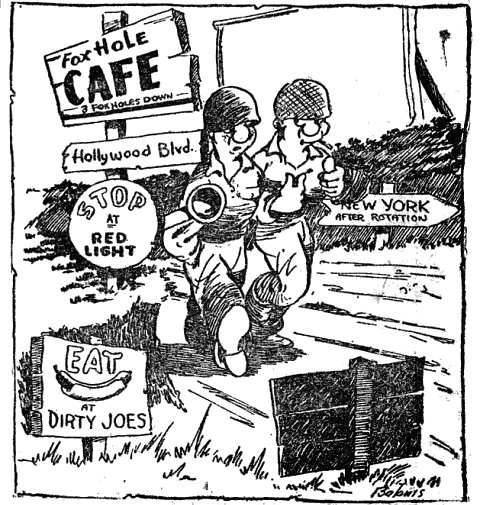 "I feel homesick."
"I feel homesick."
|
Don't think for a moment that men have refrained from laying down their arms to rest just because there has been someone standing over them. Men have fought on long after all their officers and top non-coms had been shot down. Why? Because (and this may be called flag-waving, but it's the truth) men who are out there are fighting a war because they know what the enemy's way of life could mean to them, to their loved ones and to their country.
Perhaps it would be advisable to run round-robins to the battlefronts for some people back in the States and give them a chance to catch up on the reasons "Why We Fight." Then they might go home and tell others "Why We Work."
This war is not over - not by a long shot. It will not be over until the last man falls, until the last dog-tag has been nailed to the last wooden cross, and until lasting peace is signed, sealed and secured.
We know it's not over because we see men go out and never return from a Hump mission. Others know it's not over because they see their buddies shot down over the target. Many know damn well it is not over because they have helped pull their buddies back into a foxhole after enemy snipers had done their work. And some of those who might possibly consider the job as done might well be the next ones to receive War Department telegrams.
And if this war drags on because of shortages, because of lack of supplies, who will we blame? Surely not the lathe that was idle. Surely not the drill that stopped whirring. Certainly not the men that rest in the silence of military cemeteries.
Who dares to give us cause to cast the blame on him because of idle hands and useless hours?
"Think well, for if you dare, then we are lost . . . and you!
This is Buddh Gaya, which, for some strange reason, is at Gaya, India. Now and then soldiers from the base stir up some interest in Indian culture and visit the place. Below are pictures showing some of the sights and many beggars.
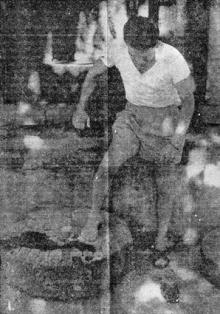 Cpl. Don Stuart, 1311 BU, tries a stone cast for size. Legend says these enormous footprints were made by Buddha, who
came to this spot to meditate under the famous pipal tree.
Cpl. Don Stuart, 1311 BU, tries a stone cast for size. Legend says these enormous footprints were made by Buddha, who
came to this spot to meditate under the famous pipal tree.
|
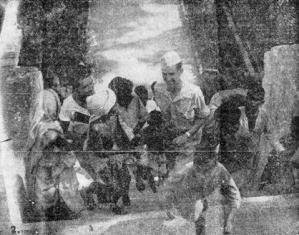 Sgt. Willis S. Graham, 1307 BU, comes from the sunken garden and runs headlong into a band of youthful beggars. The
sunken garden contains stone carvings dating to 800 A.D.
Sgt. Willis S. Graham, 1307 BU, comes from the sunken garden and runs headlong into a band of youthful beggars. The
sunken garden contains stone carvings dating to 800 A.D.
|
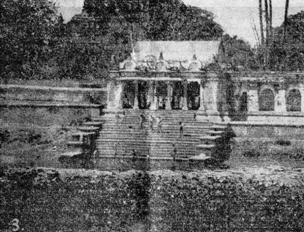 This is the wall at the edge of the lily pond where Buddha is said to have gone to pray. The shrine, built by Asoka
in 300 B.C., was restored by the Bengal government in 1881.
This is the wall at the edge of the lily pond where Buddha is said to have gone to pray. The shrine, built by Asoka
in 300 B.C., was restored by the Bengal government in 1881.
|
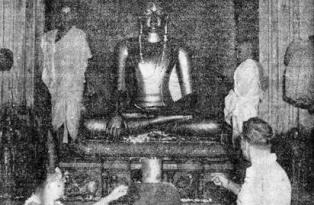 Two 1311 BU men stand in front of the verdi to watch holy men go through ceremonies before a statue of Buddha.
Two 1311 BU men stand in front of the verdi to watch holy men go through ceremonies before a statue of Buddha.
|
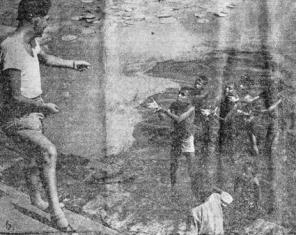 Money-minded youngsters snag many an anna at the shrine. Diving into the lily pond, they retrieve coins Cpl. Stuart tosses
into the water for them. A money-changer is always on hand to convert rupees.
Money-minded youngsters snag many an anna at the shrine. Diving into the lily pond, they retrieve coins Cpl. Stuart tosses
into the water for them. A money-changer is always on hand to convert rupees.
|
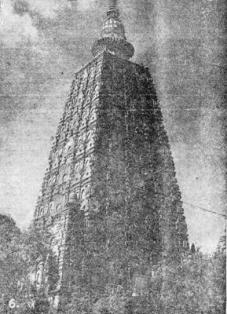 The 180-foot tower at Buddh Gaya is a landmark for pilots and a religious shrine visited each year by thousands from all
over India, Burma and Tibet.
The 180-foot tower at Buddh Gaya is a landmark for pilots and a religious shrine visited each year by thousands from all
over India, Burma and Tibet.
|
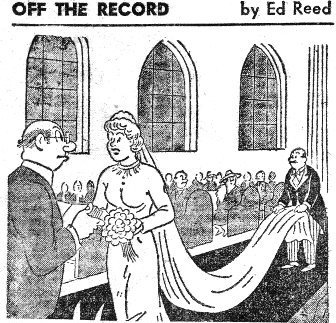
|
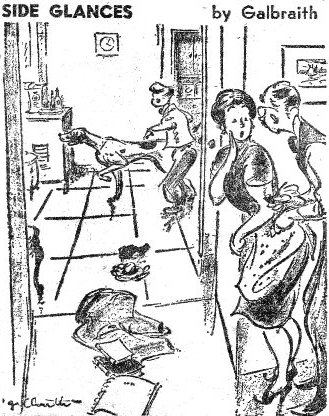
but he has taught Spot to point them out." |
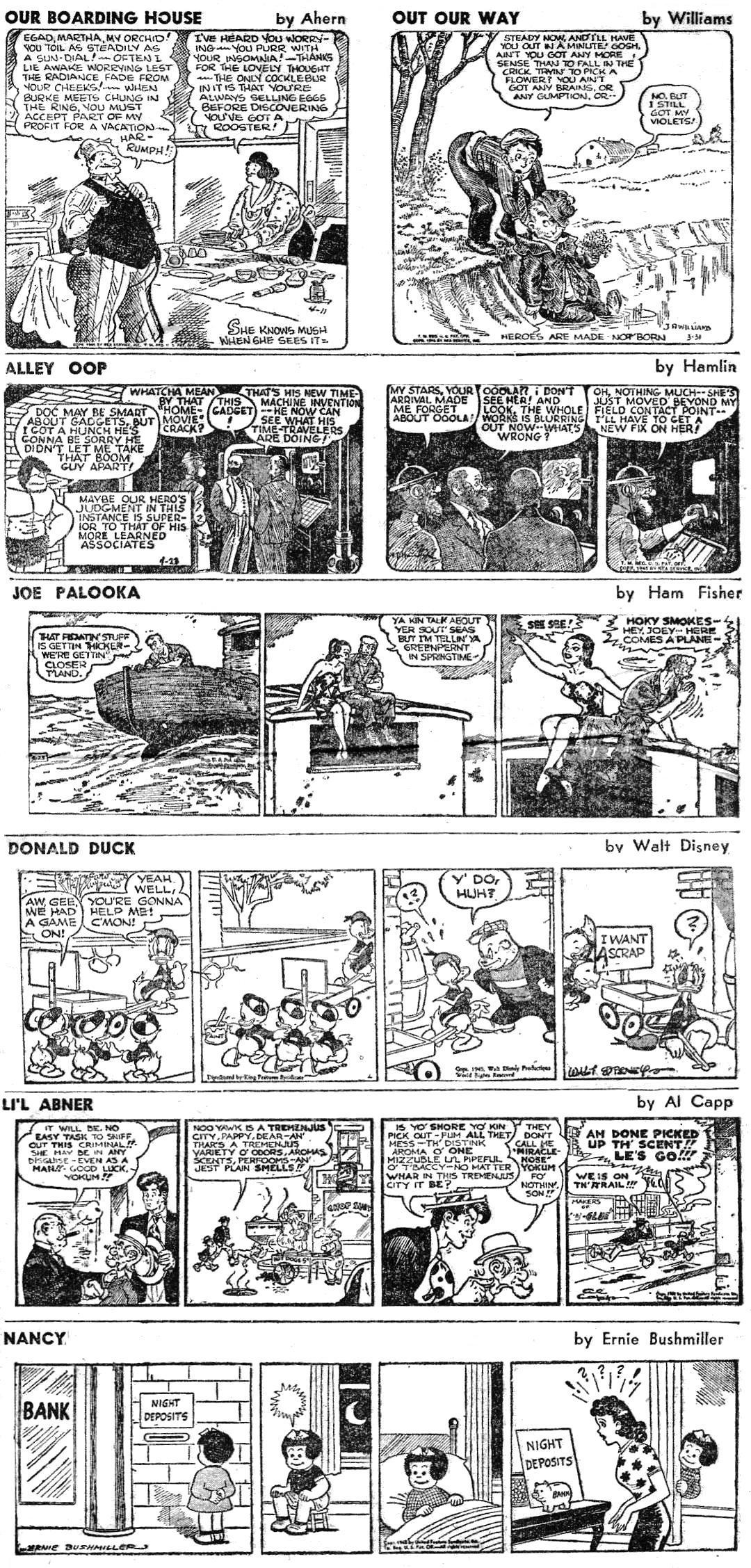
|
"NITA-ANN" RECORD - 1328 BU, Misamari, Assam - A new turnaround record for this base was set recently when Lt. William D. Wright, of Windom, Kan., made a turnaround in China in seven minutes, lowering by one minute the record Lt. Walker Taylor made a few days before. Lt. Wright's ship, the "Nita-Ann," is named after his wife, Wanita, and three-year-old daughter, Dixie Dianne.
RUBBER BUFFERS - 1342 BU, China - Using salvaged truck tires supplied by S & S here, all trucks operated by P & T for unloading airplanes are now equipped with rubber buffers. Already proved successful in eliminating damage to aircraft, this method of providing a soft buffer for the trucks was worked out by Capt. Robert J. Gentile and Sgt. Edgar W. Hunt, of P & T, and Capt. Bennett N. Rife and T/Sgt. Wilmer W. Glasgow, of S & S.
XNEW ANNIVERSARY - Kunming, China - XNEW, the Armed Forces radio station, in China, celebrated its first anniversary recently with a 15-minute birthday program. Maj. Gen. H. S. Aurand, commanding general of SOS in the China Theater, spoke and music was furnished by the District band. Cpl. Bruce W. MacDonald, former news editor for WJW, Cleveland, Ohio, was master of ceremonies. The entire program was written and produced by Sgt. David Brooks, XNEW program director.
TURNAROUND - 1305 BU, Dum Dum, India - When an Indian gets the best of an American there's nothing unusual about it, but when an American gets the best of an Indian, that's something else!
An enterprising GI persuaded a civilian clerk here to lend him, Harlan Chambers, one rupee. Since the Indian only had a five, the GI promised to bring back the change. There is no Harlan Chambers registered here and the civilian clerk only mumbles under his breath when asked about the five rupees. Kind GIs pooled their resources and restored the loss.
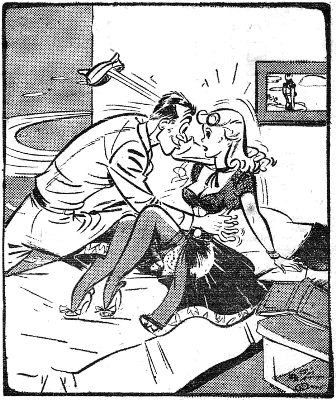 "I just happened to be in the neighborhood"
"I just happened to be in the neighborhood"
|
Poor Weather, No Radio, Engine Trouble Mark C-47 Landing
1340 BU, Kunming - The weather was bad. Neither radio was operating. The left engine cut out. One 'chute accidentally opened inside the plane and there were no extras aboard.
This was the situation recently on a "regular" trip from Chengtu to Kunming made by F/O Porter D. Rosenbaum, pilot; F/O Max W. Shrode, co-pilot, and Pfc. Joseph L. Raspor, radio operator.
In spite of the avalanche of misfortune, the men kept the plane in the air two hours and 40 minutes to bring it in safely at 1342 BU.
About 2 a.m., with the plane flying on instruments through the thick weather, the radio compass went out. Shortly thereafter the fuel system in the left engine of the C-47 failed and the engine quit.
Rosenbaum feathered the prop and called back to tell the co-pilot and radio operator to prepare to bail. Then he found out that Raspor's ripcord had caught on an obstruction in the cabin and opened.
"I told them to jettison the cargo," recalled Rosenbaum, "and when I looked back, Shrode and Raspor were throwing those 168-pound drums out the door like baseballs."
A Kunming station, temporarily off the air as a result of the storm, came on again, with an emergency transmitter and directed the crew to another field with the hope that the weather there would be clear.
Arriving in that area, the men learned that the field was closed, but flares were set off. With only a few minutes gasoline left, the plane ducked through a hole in the clouds and came in for a landing.
HUMP EXPRESS is the official newspaper of the India-China Division, Air Transport Command, APO 192, c/o Postmaster, New York, N.Y., and is published by its Public Relations office. Camp Newspaper Service and Army Newspaper Service features are used, reproduction of which is prohibited without permission of CNS and ANS, 205 East 42nd St., New York, 17, N.Y. Other material is submitted by staff members, ICD-ATC base Public Relations sections and other soldier correspondents. Printed weekly by the Hindusthan Standard, 3 Burman St., Calcutta, India, and distributed each Thursday. Passed by U.S. Press Censor for mailing.
| Military transport schedules over India for cargo, personnel and mail . . . maximum tonnage of essential war materials over the Hump . . . movement of troops and supplies in support of tactical operations in China . . . evacuation of the sick and wounded - these are the missions of ICD-ATC. |

AUGUST 9, 1945
Original issue of HUMP EXPRESS shared by CBI veteran Grover P. Fike
Copyright © 2008 Carl Warren Weidenburner
MORE ABOUT ATOMIC BOMBING OF HIROSHIMA AND NAGASAKI
TOP OF PAGE PRINT THIS PAGE ABOUT THIS PAGE E-MAIL YOUR COMMENTS
PREVIOUS ISSUE HUMP EXPRESS BASE NEXT ISSUE
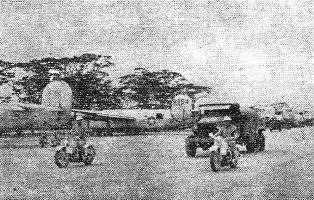 To avoid any bottlenecks in getting the gasoline to the waiting tankers, military police escorted the fuel trucks
to each plane.
To avoid any bottlenecks in getting the gasoline to the waiting tankers, military police escorted the fuel trucks
to each plane.
 Lt. Col. F. H. Forester, CO of 1340 BU in Kunming, observed and supervised proceedings on the anniversary of the
AAF from this lofty perch above operations.
Lt. Col. F. H. Forester, CO of 1340 BU in Kunming, observed and supervised proceedings on the anniversary of the
AAF from this lofty perch above operations.
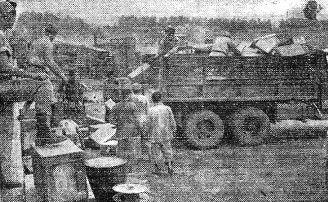 The men at 1340 unloading a part of the big load that came over the Hump on that day.
The men at 1340 unloading a part of the big load that came over the Hump on that day.
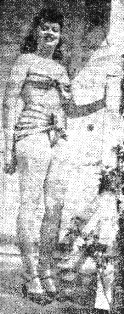 This girl merely wrote on the back of the picture, "Guess who and where." We have inside information that she's
Elva L. Sawyer and lives in Richmond, Calif. We also have learned that her husband is Sgt. R. W. Sawyer, Dum Dum,
India, who was good enough to let us look at her picture.
This girl merely wrote on the back of the picture, "Guess who and where." We have inside information that she's
Elva L. Sawyer and lives in Richmond, Calif. We also have learned that her husband is Sgt. R. W. Sawyer, Dum Dum,
India, who was good enough to let us look at her picture.
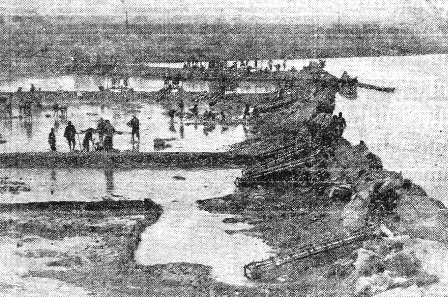 Changing the course of a river to gain rich new farmland by means of a dam, these Chinese are working to drain
the portion lying beyond the barricade. In the center of the photo by T/Sgt. Doyle F. O'Dell, 1343 BU, China,
men are seen at work on the foot-powered water scoops. The thrifty Chinese, in the process of draining operations,
trapped a good catch of fish which helped improve their diet.
Changing the course of a river to gain rich new farmland by means of a dam, these Chinese are working to drain
the portion lying beyond the barricade. In the center of the photo by T/Sgt. Doyle F. O'Dell, 1343 BU, China,
men are seen at work on the foot-powered water scoops. The thrifty Chinese, in the process of draining operations,
trapped a good catch of fish which helped improve their diet.
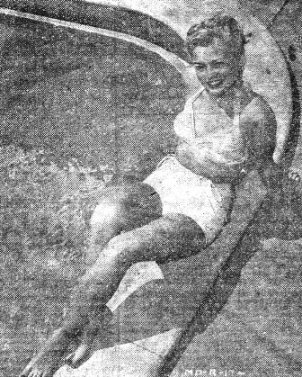 Some PA sent in this pic of Myrna Dell saying it was exclusive in "our city." Thinking that the people of Rishra
wouldn't appreciate it, we pass it on.
Some PA sent in this pic of Myrna Dell saying it was exclusive in "our city." Thinking that the people of Rishra
wouldn't appreciate it, we pass it on.
 S/Sgt. Jack W. Swilley, Camilla, Ga., often acts as "meeter and greeter" in his capacity as transient clerk at
1340 BU, Kunming, but he takes a special interest in this little traveler in pigtails. She is one of a number of
French refugees flown from the India-China border. After receiving medical care and clothing the evacuees were
flown over the Hump.
S/Sgt. Jack W. Swilley, Camilla, Ga., often acts as "meeter and greeter" in his capacity as transient clerk at
1340 BU, Kunming, but he takes a special interest in this little traveler in pigtails. She is one of a number of
French refugees flown from the India-China border. After receiving medical care and clothing the evacuees were
flown over the Hump.
